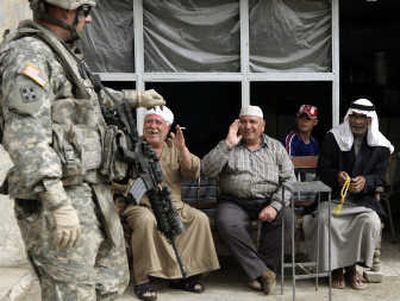Clashes spread across Iraq

BAGHDAD – With the United States providing air cover and embedded advisers, the Iraqi government on Wednesday expanded its offensive against Shiite Muslim militias from the port city of Basra to the capital of Baghdad – and many of the provinces in between.
The day saw street battles in Baghdad and Basra, mortar attacks by Shiite rebels against Baghdad’s Green Zone, bombing by U.S. aircraft and encounters that left government tanks in flames. More than 97 people were reported killed and hundreds were wounded since the operation began early Tuesday. Two U.S. soldiers were killed by hostile fire in separate attacks Wednesday in Baghdad, the military said.
In Baghdad, at least nine Iraqi civilians were killed and 42 were wounded in mortar attacks, police said. The Mahdi Army, loyal to firebrand Shiite cleric Muqtada al-Sadr, opened fire on civilians in downtown Baghdad and clashed with Iraqi security forces in Kadhemiya in north Baghdad.
In Baghdad’s Shiite Sadr City neighborhood, clashes between the Mahdi Army and Iraqi security forces supported by U.S. forces left at least 20 dead and 115 injured. By early afternoon, people took to the streets in protest of the Iraqi government.
Mortar rounds crashed into the heavily fortified Green Zone for the third straight day, injuring three U.S. government employees, all U.S. citizens, said U.S. Embassy spokeswoman Mirembe Nantongo.
Shiite Prime Minister Nouri al-Maliki, who’s directing the operation from Basra, gave the armed groups 72 hours to give up their weapons and surrender without consequences, warning that they’d be treated as outlaws if they didn’t.
But al-Sadr demanded that al-Maliki leave Basra and send a parliamentary delegation to hold a dialogue. Al-Maliki immediately rebuffed the demand.
Al-Maliki appears to be taking a huge risk in confronting the volatile city, which is dominated by the Mahdi Army.
There were growing signs that al-Sadr’s cease-fire, which he declared in August and renewed in February, was unraveling. The cease-fire is one of the principal reasons for the downturn in violence and U.S. troop deaths this year.
“I hope they will stay with the freeze, but I’m not sure currently if the Jaysh al Mahdi (Mahdi Army) is still freezing its activities,” said Sadiq al-Rikabi, al-Maliki’s adviser.